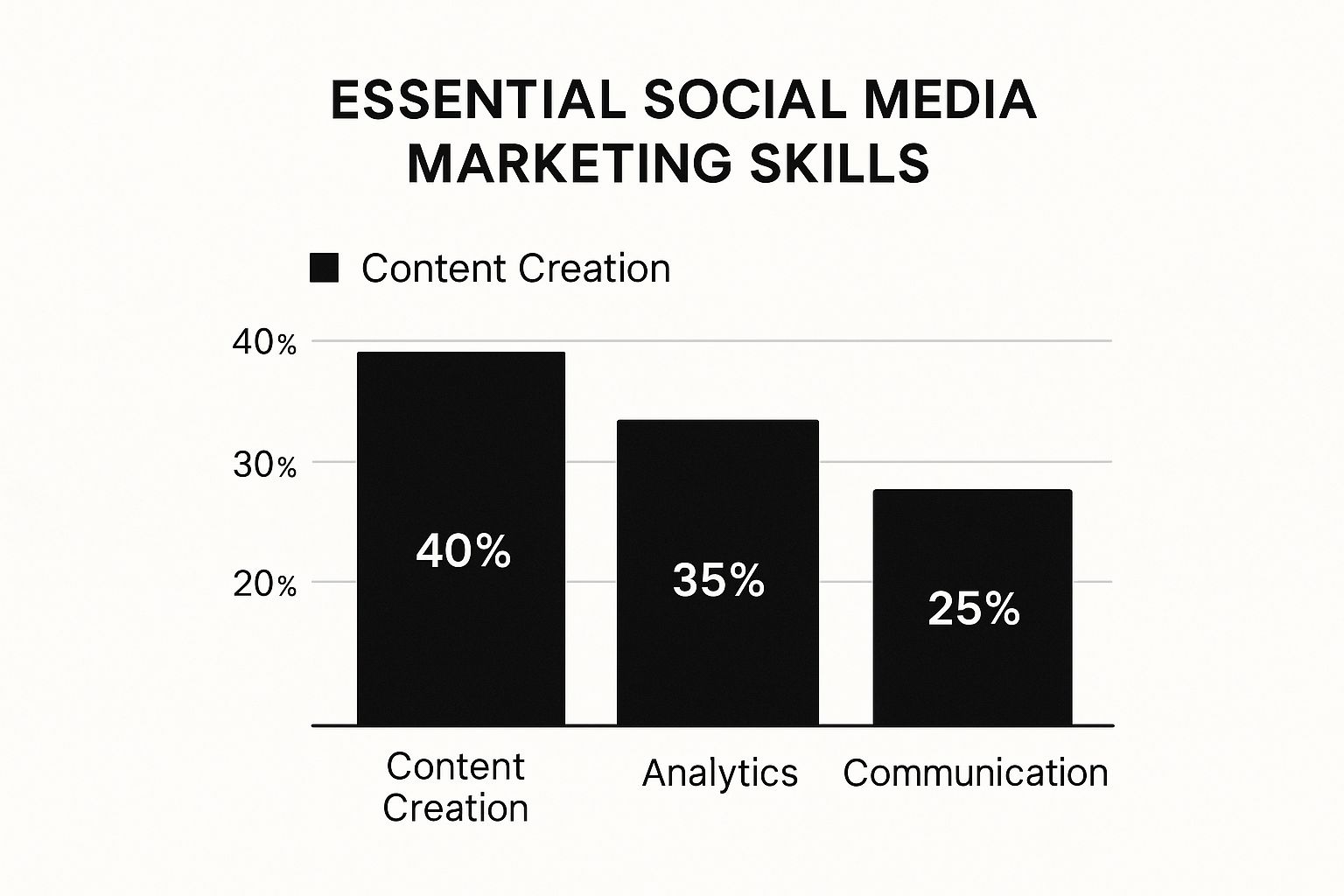
How to Become a Social Media Marketer: Complete Career Guide
Published
Understanding What It Really Takes To Succeed

Successful social media marketing involves more than just attractive visuals. It requires a thorough understanding of the constantly changing social media environment. This includes keeping up with algorithm changes, identifying new platforms, and adapting to shifting audience preferences. It's a continuous process of learning and evolution.
Social media platforms and their trends are in constant flux. A prime example is the growing integration of generative AI. Over three-quarters of senior executives overseeing social strategies now use AI to improve their social media efforts, according to Hootsuite. AI's role extends beyond content creation to strategic planning, campaign management, and even brand forecasting. Staying ahead in this field requires ongoing adaptation and a commitment to learning.
Beyond Vanity Metrics: Measuring Real Impact
The way we measure success in social media is changing. Traditional metrics like likes and shares are no longer reliable indicators of true impact. Instead, social media marketers need to focus on metrics that reflect actual business results. These include website traffic, lead generation, and conversions.
For instance, rather than simply counting likes, successful marketers analyze how a post contributes to driving traffic to a specific landing page. This shift requires a stronger understanding of data analysis and the ability to link social media activity to tangible business outcomes.
The Human Element: Connecting With Your Audience
Technical skills are essential, but they aren't the only ingredient for social media success. Building authentic relationships with your audience is crucial. This means understanding their needs, interests, and challenges. It’s about creating a community and producing content that resonates emotionally.
A solid community foundation is essential for long-term success. For those looking to enhance their understanding, this resource may prove helpful: How to master social media marketing interview questions. This focus on the human element distinguishes truly successful social media marketers. Ultimately, success combines technical expertise with a deep understanding of human behavior and connection.
Essential Skills That Actually Matter In The Real World

The infographic above illustrates the importance of three essential social media marketing skills, as ranked by industry professionals. Content creation takes the lead at 40%, followed by analytics at 35%, and communication at 25%. This highlights the need for a well-rounded skill set. While compelling content is essential, the ability to analyze data and communicate effectively is crucial for campaign optimization and community building. For a deeper dive into the role of a social media manager, check out this resource: How to master social media manager requirements.
Content Creation: More Than Just Pretty Pictures
Engaging content is the foundation of attracting and retaining an audience. It's about crafting content that resonates with your target demographic, reflects your brand's voice, and achieves specific marketing goals. This includes understanding various content formats, from short-form videos to long-form blog posts, and tailoring your approach to each platform.
For example, Instagram prioritizes visually appealing content like Reels and carousels. Instagram thrives on visual content, while Twitter (X) favors concise, text-based updates and active conversations. This means social media marketers need versatility and adaptability in their content strategies.
Analytics: Data Storytelling For Impact
Data analytics is essential for measuring social media campaign effectiveness. It's more than just reading dashboards; it's about interpreting data and converting it into actionable insights. This is where data storytelling becomes vital. It's about weaving a narrative around the numbers to showcase the impact of your work and justify your strategies.
For instance, rather than just reporting an increase in followers, explain how that growth correlates with website traffic and lead generation. This ability to interpret data effectively is increasingly valuable in today's data-driven business environment.
Communication: Building And Nurturing Communities
Effective communication is crucial for community management. It's about engaging with your audience, responding to comments and messages, and creating a sense of belonging. This requires strong interpersonal skills, empathy, and the ability to handle feedback gracefully. Clear communication is also essential for collaboration with colleagues, clients, and influencers.
Building strong relationships with your audience and within your team is key to becoming a successful social media marketer. These soft skills, often overlooked, are vital for long-term success.
To further illustrate the skill progression in social media marketing, take a look at the following comparison table:
The table below, "Core Skills Comparison: Beginner vs. Advanced Social Media Marketers," offers a detailed comparison showcasing the skill progression from entry-level to advanced positions.
| Skill Category | Beginner Level | Advanced Level | Key Learning Resources |
|---|---|---|---|
| Content Creation | Basic understanding of content formats; Creates simple posts and visuals | Mastery of various content formats; Develops comprehensive content strategies; Understands platform-specific best practices | HubSpot Academy, Skillshare |
| Analytics | Basic understanding of platform analytics; Tracks basic metrics | Advanced data analysis and interpretation; Uses data to inform strategy and optimize campaigns; Proficient in analytics tools | Google Analytics Academy, DataCamp |
| Communication | Responds to comments and messages; Basic community engagement | Proactively engages with the audience; Builds and manages online communities; Handles crisis communication effectively | Sprout Social, Buffer |
This table highlights the key differences and similarities between beginner and advanced social media marketers across crucial skill categories. It also provides valuable learning resources for those looking to enhance their skills. The progression emphasizes the importance of continuous learning and development in this dynamic field.
Mastering Platform Strategies That Drive Real Results

Each social media platform has its own distinct personality. Understanding these nuances is essential for success as a social media marketer. This goes beyond simply knowing each platform's demographics. It means understanding the unspoken rules, the kind of content that performs well, and the overall culture.
Navigating Declining Engagement Rates
One significant challenge facing social media marketers is the decline in organic reach and engagement. Engagement rates across major social media platforms have seen a substantial drop. The 2025 Social Media Industry Benchmark Report reveals that Facebook, Instagram, TikTok, and Twitter (X) saw declines of 36%, 16%, 34%, and 48%, respectively. This requires a strategic shift, focusing on quality content and understanding what truly connects with audiences on each platform. More detailed statistics can be found here.
Declining engagement doesn't spell the end of social media. It simply means marketers need to be more strategic. For instance, while Reels are a popular format on Instagram, carousels often generate higher engagement. This underscores the importance of ongoing testing and adaptation.
Content Format Optimization
Different content formats perform differently across various platforms. Short-form video content may be king on TikTok, while long-form articles might find more success on LinkedIn. Images, carousels, and stories all have unique strengths and weaknesses on different platforms. Understanding these nuances is key to optimizing your content strategy.
Platform algorithms also play a crucial role. Algorithms are constantly evolving, so what worked in the past might not work today. Staying up-to-date on algorithm updates and their implications is essential for success.
Maintaining Brand Consistency Across Platforms
While adapting to each platform's characteristics is vital, maintaining brand consistency is equally important. Your brand's voice and messaging should be recognizable across all platforms, even if the content format and style differ. This creates a unified brand experience for your audience, regardless of where they interact with you.
Establishing clear brand guidelines for tone, visuals, and messaging is essential. This ensures your brand identity remains consistent, fostering recognition and trust with your audience. One way to build trust is by verifying your accounts. Learn how to verify your social media accounts.
Evaluating Emerging Platforms
New social media platforms are constantly appearing. While it's tempting to join every new platform, it's crucial to strategically evaluate which platforms align with your target audience and marketing goals. This prevents spreading resources thin and focuses efforts on platforms where you can achieve the biggest impact. Analyzing user demographics, platform features, and potential reach can inform decisions about where to allocate time and budget.
Spotting Tomorrow's Opportunities Before Everyone Else

The most effective social media marketers are proactive, always looking ahead. They don't simply react to changes in the social media landscape; they anticipate them. This forward-thinking approach allows them to seize emerging trends and platforms before their competitors, giving them a distinct edge. It involves staying informed about industry developments, analyzing relevant data, and understanding the evolving needs of their target audience.
Identifying Emerging Platforms and Features
Staying ahead of the curve means identifying emerging platforms and features with significant potential. This requires ongoing monitoring of the social media landscape and a sharp eye for innovative trends. For example, Threads, launched in the summer of 2023, quickly became the fastest-growing social media platform across multiple generations.
This rapid growth was fueled by users seeking real-time news and engaging online communities. This trend is also reflected on platforms like Reddit, X (formerly Twitter), and Telegram Messenger. For social media marketers, awareness of these shifts is essential for staying competitive and effectively connecting with their audience. You can find more in-depth social media statistics at GWI.
This proactive approach necessitates exploring newer platforms beyond the established ones. However, it’s important to strike a balance. Not every new platform will achieve widespread adoption and success.
Separating Future Successes From Fads
Distinguishing between promising platforms and passing fads is vital for effective allocation of time and resources. This involves analyzing crucial indicators like user growth, engagement rates, and demographic alignment with your target audience. Remember, social media marketing is a key component of a broader retail marketing strategy. Learning about overall retail marketing strategies will help you contextualize your platform-specific approaches. By carefully evaluating these factors, you can avoid investing time in platforms that ultimately fail to gain traction.
Consider the varying trajectories of different social media platforms. Some, like TikTok, experienced explosive growth, while others faded into obscurity. Understanding the factors that contribute to platform success or failure is crucial for making informed decisions.
Testing New Channels Strategically
Experimentation is key to discovering the next big opportunity in social media. However, it’s important to test new channels strategically without neglecting your existing successful strategies. This means dedicating a portion of your resources to exploring new platforms while maintaining a robust presence on established ones. This balanced approach allows you to explore potential growth areas without compromising current success.
This might involve running small-scale campaigns on emerging platforms to assess their performance. This provides valuable data to inform decisions about future investments. This experimental approach is crucial for staying agile and adapting to the dynamic social media environment. It’s all about continuous learning, adaptation, and a willingness to embrace new opportunities. This proactive mindset sets successful social media marketers apart. By staying informed, analyzing trends, and strategically testing new channels, you can position yourself at the forefront of the industry and achieve long-term success.
Building Your Career Path With Strategic Intention
So, you're ready to embark on a career in social media marketing? It's a dynamic and exciting field, brimming with possibilities. However, achieving success requires more than just enthusiasm; it demands a strategic approach. This involves not only acquiring sought-after skills but also carefully planning your career trajectory in alignment with your personal goals and the ever-changing market.
Exploring Entry Points and Building Your Portfolio
There are various ways to enter the world of social media marketing. Internships at fast-growing startups offer valuable hands-on experience, while freelance projects allow you to build your skills independently. Even without prior formal experience, you can demonstrate your abilities by crafting a compelling portfolio.
This could involve managing your own social media presence, volunteering your expertise to a non-profit, or taking on pro bono work for small businesses. These practical experiences allow you to apply your knowledge and showcase your capabilities to prospective employers. A strong portfolio acts as a testament to your skills, giving potential employers concrete evidence of what you can contribute.
Certifications and Networking Strategies That Make a Difference
While a formal degree can be advantageous, certifications provide evidence of specialized skills in particular areas of social media marketing. Highly regarded certifications include those focused on paid advertising, analytics, and managing specific platforms like Facebook or Instagram. Combining certifications with practical experience creates a powerful resume that can unlock numerous opportunities.
Networking is equally vital for career advancement. Engaging authentically with fellow professionals builds valuable relationships and expands your network. These connections offer insights into industry trends and can even lead to job prospects. Consider resources like this article on How to master your social media marketing career path for further guidance. Remember, genuine interaction trumps simply collecting contacts.
Career Trajectories and Specialized Roles
Social media marketing encompasses diverse career paths. Some professionals specialize in paid advertising, designing and managing campaigns across various platforms. Others focus on influencer partnerships, linking brands with relevant influencers to connect with their target audience. Data-driven marketers delve into analytics, extracting valuable insights and optimizing campaigns based on performance metrics. Understanding these diverse roles allows you to tailor your skills and pursue a path that resonates with your interests.
Each specialization demands a unique skill set. Paid advertising specialists require a deep understanding of campaign management and budget allocation. Influencer marketing experts must excel at identifying and cultivating relationships with key influencers. Analytics professionals require strong analytical skills to interpret data and inform campaign optimization.
Salary Negotiations and Advancement Opportunities
When negotiating salary, research industry benchmarks and understand your worth. Factors such as your skills, experience, and location all play a role. Clearly articulating your value and demonstrating your contributions during the interview process will help you secure a competitive offer. Also, consider the possibility of remote work, a common perk in this field.
Advancement in social media marketing is often tied to performance and continuous learning. Staying up-to-date with industry developments, acquiring new skills, and taking on increased responsibilities positions you for promotions and leadership positions.
The following table provides a glimpse into potential career progression and salary expectations:
Social Media Marketing Career Progression and Salary Data: Comprehensive breakdown of role levels, responsibilities, and compensation ranges in social media marketing
| Position Level | Key Responsibilities | Required Experience | Average Salary Range | Growth Opportunities |
|---|---|---|---|---|
| Social Media Coordinator | Content creation, community management, basic analytics | Entry-level to 1 year | $35,000 - $50,000 | Social Media Specialist |
| Social Media Specialist | Developing and implementing social media strategies, managing campaigns, data analysis | 1-3 years | $45,000 - $65,000 | Social Media Manager |
| Social Media Manager | Overseeing social media strategy, team management, advanced analytics, budget management | 3-5 years | $60,000 - $90,000 | Social Media Director |
| Social Media Director | Leading social media strategy, department management, strategic planning, influencer marketing | 5+ years | $80,000+ | VP of Marketing |
Keep in mind that these figures are averages and can fluctuate based on location, company size, and specific skill sets. A thriving career in social media marketing requires continuous learning, adaptability, and a genuine passion for engaging audiences. By building a solid portfolio, obtaining relevant certifications, and networking strategically, you can pave the way for a fulfilling career in this dynamic field.
Your Strategic Toolkit For Long-Term Success
Becoming a social media marketer takes more than just platform familiarity. It requires a strategic approach to tools, learning, and continuous improvement. This section equips you with the resources and frameworks necessary for long-term success in this dynamic field.
Essential Tools for Content, Scheduling, and Analytics
The right tools can significantly amplify your effectiveness. For content creation, consider free options like Canva for basic graphic design and premium tools like Adobe Creative Suite for advanced visuals. Scheduling tools, such as Buffer and Hootsuite, help manage your content calendar efficiently. Meanwhile, analytics platforms like Google Analytics and platform-specific insights provide crucial performance data.
- Content Creation: Canva (Free/Paid), Adobe Creative Suite (Paid)
- Scheduling: Buffer (Free/Paid), Hootsuite (Free/Paid), Later (Free/Paid)
- Analytics: Google Analytics (Free), Native Platform Analytics (Free)
Choosing the right tools depends on your budget and specific needs. As a beginner, free options are a great starting point. As you grow, investing in premium tools can unlock advanced features and streamline your workflow.
Continuous Learning: Staying Ahead of the Curve
The social media landscape is constantly changing. Staying informed is crucial for remaining competitive. Follow leading industry blogs like Social Media Examiner and HubSpot, subscribe to relevant newsletters, and engage in online communities. This will help you keep up with emerging trends and best practices.
Additionally, consider joining professional organizations and attending industry conferences. These provide opportunities to expand your network and learn from seasoned marketers. This ongoing learning is not just about acquiring new information; it's about adapting your strategies to the field's ever-changing demands.
Building a 90-Day Action Plan for Launch
A structured action plan provides a clear roadmap for your first 90 days as a social media marketer. Begin by setting SMART goals: Specific, Measurable, Achievable, Relevant, and Time-bound. For example, you could aim to increase follower engagement by 15% within the first quarter.
- Month 1: Focus on platform audits and competitor analysis.
- Month 2: Develop and implement content strategies.
- Month 3: Analyze results and refine your approach based on the data.
Regularly tracking your progress against these milestones is crucial for staying on track and demonstrating your value. This data-driven approach showcases your ability to deliver results and adapt strategies based on real-world performance.
Systems for Continuous Improvement and Avoiding Burnout
Long-term success requires sustainable practices. Establish systems for content planning, scheduling, and performance analysis. This streamlines your workflow and prevents feeling overwhelmed. Prioritize tasks, delegate where possible, and schedule regular breaks to avoid burnout.
- Batch content creation: Dedicate specific times for creating content to maximize efficiency.
- Use project management tools: Organize tasks, track progress, and collaborate effectively.
- Schedule regular breaks: Prevent burnout and maintain a healthy work-life balance.
This structured approach not only improves efficiency but also enables continuous analysis and strategy improvement. It's about working smarter, not harder, for sustainable success.
Ready to advance your social media marketing career? Influencer Marketing Jobs connects talented professionals with exciting opportunities in the dynamic world of influencer and digital marketing. Explore a diverse range of job openings, from entry-level to senior positions, and discover your perfect role today. Find your dream job in influencer marketing now!